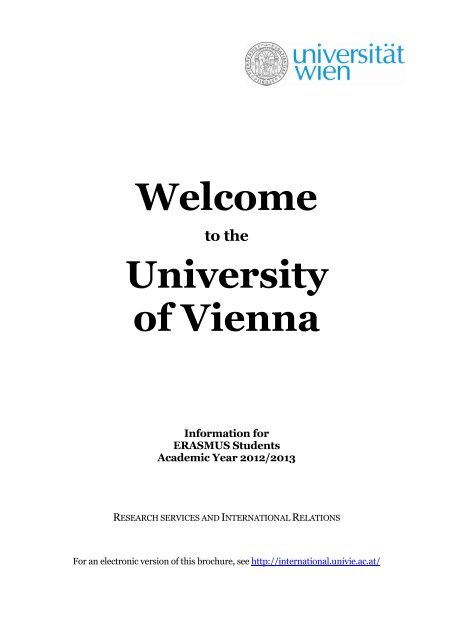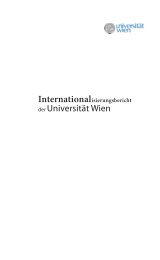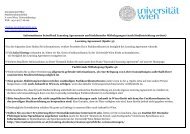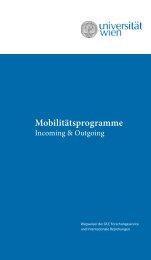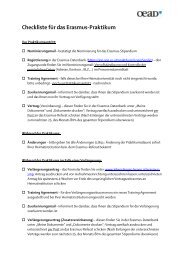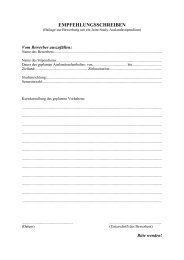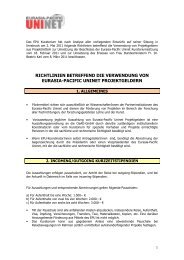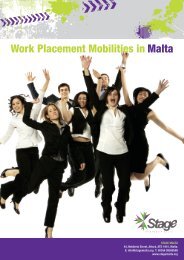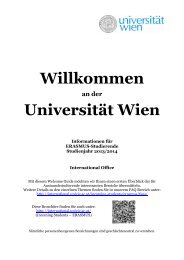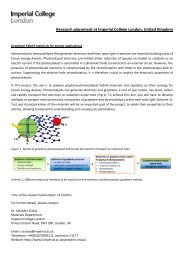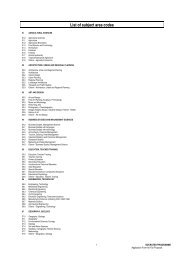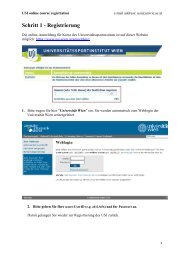University of Vienna - Internationale Beziehungen - Universität Wien
University of Vienna - Internationale Beziehungen - Universität Wien
University of Vienna - Internationale Beziehungen - Universität Wien
You also want an ePaper? Increase the reach of your titles
YUMPU automatically turns print PDFs into web optimized ePapers that Google loves.
Welcometo the<strong>University</strong><strong>of</strong> <strong>Vienna</strong>Information forERASMUS StudentsAcademic Year 2012/2013RESEARCH SERVICES AND INTERNATIONAL RELATIONSFor an electronic version <strong>of</strong> this brochure, see http://international.univie.ac.at/
CHECKLIST FOR ERASMUS STUDENTS‣ BEFORE your departure to <strong>Vienna</strong>A) Enrolment: In order to be able to prepare your enrolment at the <strong>University</strong> <strong>of</strong> <strong>Vienna</strong> as anERASMUS student, the following steps will be necessary:1. Nomination by your home universityDeadline: June 1 (for the winter semester) or December 1 (for the summer semester)After you have been nominated by your home university, we will send you an e-mail withthe further steps you have to take.If you have not received this e-mail by June 10 (for the winter semester) or December 10 (forthe summer semester), please send us a message to the following e-mail address:erasmus.incoming@univie.ac.at2. Completion <strong>of</strong> the “online pre-registration” – see chapter I-EFor this please use our „guide for the online pre-registration“Deadline: July 1 (for the winter semester) or December 31 (for the summer semester)3. Conveyance <strong>of</strong> the "ERASMUS-Certificate“, filled in as well assigned and stamped by your home university – see chapter I-E(by fax or scanned by e-mail as well as alternatively attached during the online pre-registrationwould be sufficient)Deadline: July 1 (for the winter semester) or December 31 (for the summer semester)B) Accomodation: If you want to book accommodation before your arrival in <strong>Vienna</strong>, you canfind detailed information regarding your options in chapter II-DC) Language skills: With few exceptions, the language <strong>of</strong> instruction at the <strong>University</strong> <strong>of</strong><strong>Vienna</strong> is usually German. For more information, including the possibility <strong>of</strong> attending apreparatory German language course: see chapter I-FD) Buddy System: If you would like to get a Buddy ("buddies" are students who helpERASMUS students to get acquainted with university life in <strong>Vienna</strong>), please apply on theESN website: http://esn.univie.ac.at/anmeldung_needbuddy.php (see also chapter I-I)E) Courses: You will find the course catalogue here (see also chapter I-B-5):http://vorlesungsverzeichnis.univie.ac.at. For questions on courses and course registration(see also chapter I-B-2), please contact your departmental coordinator at the <strong>University</strong><strong>of</strong> <strong>Vienna</strong> (see chapter I-D).‣ AFTER your arrival in <strong>Vienna</strong>1. Visit the Student Mobility Office (Büro für Studierendenmobilität) 1010 <strong>Wien</strong>,Dr.-Karl-Lueger-Ring 1 (see chapter I-C), as soon as possible, but not later than October 10(for the winter semester) or March 10 (for the summer semester).2. Visit your departmental coodinator during consultation hours to obtain a signature foryour Learning Agreement or to clarify questions you might have regarding the courses<strong>of</strong>fered at the <strong>University</strong> <strong>of</strong> <strong>Vienna</strong>: see chapter I-D3. Please register your address at the Municipal District Office (MagistratischesBezirksamt) within three days <strong>of</strong> your arrival in Austria (see chapter II-A-2).4. Get your “Confirmation <strong>of</strong> Registration”: As an EU/EEA or Swiss citizen staying inAustria for a period exceeding 3 months, you have to get a Confirmation <strong>of</strong> Registration(Anmeldebescheinigung) from the Municipal Department 35 (Magistratsabteilung 35)within 4 months <strong>of</strong> your arrival in <strong>Vienna</strong> (see chapter II-A-3).In addition to the Welcome Guide, further information and updates can be foundon our website. Please also take a look at our Frequently Asked Questions (FAQs):http://international.univie.ac.at/2
I. THE UNIVERSITY OF VIENNA (A-WIEN01) ............................................................. 4I-A. General Information ...................................................................................................... 4I-B. Studying at the <strong>University</strong> <strong>of</strong> <strong>Vienna</strong> ............................................................................... 41. General information on studying in Austria .................................................................................................42. Learning Agreement, registering for courses ................................................................................................43. Grading system, examinations and transcript .............................................................................................. 54. ECTS .............................................................................................................................................................65. The course catalogue.....................................................................................................................................66. The academic year <strong>of</strong> 2012/2013 ..................................................................................................................6I-C. Research Services and International Relations – Student Mobility Office .......................... 7ERASMUS Incoming contact data ................................................................................................................... 7I-D. ERASMUS Departmental Coordinator ............................................................................ 8I-E. Enrolment, recommended period <strong>of</strong> arrival and ORIENTATION ..................................... 8I-F. Language requirements/German language courses ...................................................... 9I-G. Students with special needs ......................................................................................... 10I-H. Austrian National Union <strong>of</strong> Students (ÖH) .................................................................. 11I-I. ERASMUS Student Network (ESN) ............................................................................... 11II. GENERAL PRACTICAL INFORMATION ................................................................. 12II-A. Entry and residence requirements ............................................................................. 121. Entry and residence ................................................................................................................................... 122. Registration <strong>of</strong> your address in <strong>Vienna</strong> (Meldezettel) ............................................................................ 133. Confirmation <strong>of</strong> Registration (Anmeldebescheinigung) for EU/EEA and Swiss citizens .................... 134. Notice <strong>of</strong> departure before leaving Austria .............................................................................................. 13II-B. Arrival in <strong>Vienna</strong> ........................................................................................................ 131. Arrival at <strong>Vienna</strong> Airport (Flughafen <strong>Wien</strong>-Schwechat) ........................................................................ 132. Arrival by train .......................................................................................................................................... 14II-C. Living expenses ............................................................................................................ 14II-D. Accommodation ......................................................................................................... 141. Halls <strong>of</strong> residence ...................................................................................................................................... 142. Private accommodation ............................................................................................................................ 153. Youth hostels ............................................................................................................................................. 15II-E. Health insurance ........................................................................................................ 15II-F. Libraries ..................................................................................................................... 161. The Library <strong>of</strong> the <strong>University</strong> <strong>of</strong> <strong>Vienna</strong> (Universitätsbibliothek, UB) .................................................. 162. The Austrian National Library ................................................................................................................. 173. Libraries <strong>of</strong> the City <strong>of</strong> <strong>Vienna</strong> .................................................................................................................. 17II-G. IT-Services <strong>of</strong> the <strong>University</strong> <strong>of</strong> <strong>Vienna</strong> ....................................................................... 171. u:net/UNIVISonline .................................................................................................................................. 172. <strong>Vienna</strong> <strong>University</strong> Computer Center (Zentraler Informatikdienst, ZID) / IT-courses ........................ 183. Print and Copy Service .............................................................................................................................. 18II-H. Other practical tips ..................................................................................................... 181. Price reductions for students .................................................................................................................... 182. Opening hours <strong>of</strong> shops ............................................................................................................................ 183. Banks/post <strong>of</strong>fices ..................................................................................................................................... 184. Public transport ......................................................................................................................................... 185. Travelling ................................................................................................................................................... 196. What to do in case <strong>of</strong> theft or loss ............................................................................................................ 19II-I. Leisure activities .......................................................................................................... 191. Sightseeing, concerts, museums ............................................................................................................... 192. Cinemas, theatres ..................................................................................................................................... 203. Sports ........................................................................................................................................................ 204. Canteens ................................................................................................................................................... 205. Markets ..................................................................................................................................................... 20II-J. Emergency telephone numbers ................................................................................... 21II-K. Safety information ...................................................................................................... 21II-L. Abbreviations .............................................................................................................. 213
I. THE UNIVERSITY OF VIENNA (A-WIEN01)I-A. General Informationhttp://www.univie.ac.athttp://info.wien.at; city map: http://www.wien.gv.at/stadtplanThe <strong>University</strong> <strong>of</strong> <strong>Vienna</strong> was founded in 1365 by Duke Rudolf IV. It is one <strong>of</strong> the oldest and largestuniversities in Europe. Approximately 91.000 students are currently enrolled at the <strong>University</strong> <strong>of</strong><strong>Vienna</strong>; the university <strong>of</strong>fers more than 180 different fields <strong>of</strong> study.With its approximately 9,400 employees, about 6,700 <strong>of</strong> whom are members <strong>of</strong> the scientific staff,the <strong>University</strong> <strong>of</strong> <strong>Vienna</strong> is the largest teaching and research institution in Austria. Research andteaching at the <strong>University</strong> <strong>of</strong> <strong>Vienna</strong> cover a wide spectrum <strong>of</strong> scientific disciplines. The <strong>University</strong> <strong>of</strong><strong>Vienna</strong> aims to maintain this broad spectrum <strong>of</strong> disciplines, to promote new and innovative fields <strong>of</strong>research and to create stronger links and interconnections between disciplines.The scientific institutions <strong>of</strong> the <strong>University</strong> <strong>of</strong> <strong>Vienna</strong> are spread over more than 60 locations (for anoverview, see http://www.univie.ac.at/plaene/institute.html). The main building is situated on theRingstraße in the centre <strong>of</strong> <strong>Vienna</strong> (U2 underground station: Universität – Schottentor). This mainbuilding, opened in 1884, now houses various administrative <strong>of</strong>fices and the main library, as well asseveral departments and a large number <strong>of</strong> lecture halls. The inner courtyard (Arkadenh<strong>of</strong>) containsa gallery <strong>of</strong> busts <strong>of</strong> famous members <strong>of</strong> the university. The main building also houses the StudentMobility Office (Büro für Studierendenmobilität).Use the following link to see a corporate video <strong>of</strong> the <strong>University</strong> <strong>of</strong> <strong>Vienna</strong>:http://www.univie.ac.at/universitaet/imagefilm-der-universitaet-wien/I-B. Studying at the <strong>University</strong> <strong>of</strong> <strong>Vienna</strong>1. General information on studying in Austriahttp://bmwf.gv.at/startseite/studierende/studieren_in_oesterreich/The <strong>University</strong> <strong>of</strong> <strong>Vienna</strong> is a public university. All high-school graduates who have obtained anAustrian secondary school leaving certificate ("Matura“, corresponding to a German "Abitur" orEnglish "A-levels“) or another type <strong>of</strong> secondary certificate recognised in Austria ("Reifezeugnis"), orwho have passed a special university entrance qualification exam ("Berufsreifeprüfung" or"Studienberechtigungsprüfung") may apply for admission.The <strong>University</strong> <strong>of</strong> <strong>Vienna</strong> has mostly implemented the Bologna system. Also new studyprogrammes are established continuously (bachelor, master, PhD). For updated information, seehttp://studentpoint.univie.ac.at/Austrian students are given a relatively high amount <strong>of</strong> freedom in planning their studies. Theycreate their own timetables for each semester and are accustomed to working independently. Formore detailed information regarding curricula, see the websites <strong>of</strong> the departments <strong>of</strong> the relevantfield <strong>of</strong> study: http://data.univie.ac.at/persSome helpful web pages: http://studentpoint.univie.ac.at/,http://www.oeh.univie.ac.at/kontakt/fakultaets-und-studienvertretungen.html2. Learning Agreement, registering for coursesAs the procedure regarding the topic <strong>of</strong> Learning Agreement varies from partner universityto partner university, we kindly ask you to discuss with your university and also with yourdepartmental coordination at the <strong>University</strong> <strong>of</strong> <strong>Vienna</strong>, if the Learning Agreement hasto be signed already before the beginning <strong>of</strong> your stay (as well as if it would be sufficient to sendit scanned by e-mail or if it should be sent by post), to ensure a most efficient treatment (on ourpart it would not be necessary to send it before your arrival in <strong>Vienna</strong>).4
In case it has to be signed before you travel to <strong>Vienna</strong>, please consider that it is necessary thatwe have received your ERASMUS-Certificate before you send your Learning Agreement to thedepartmental coordinator at the <strong>University</strong> <strong>of</strong> <strong>Vienna</strong> and only to fill in courses in the field <strong>of</strong>study you have been nominated (in accordance with the existing bilateral agreements) andaccepted for.If you are interested in taking courses from other fields <strong>of</strong> study, please discuss your wishesdirectly with the departmental coordinator <strong>of</strong> the other field <strong>of</strong> study after your arrival in<strong>Vienna</strong>. However, it cannot be guaranteed that there will be a place available to attend the additionalcourse. Once accepted, you would have to fill in an extra Learning Agreement form foreach field <strong>of</strong> study, as it has to be signed in each case by a different departmental coordinator.Excluded from the regulation are the German courses listed in the chapter I-F, as they are eligiblefor all international students. (For the German courses <strong>of</strong> the Innovationszentrum, pleaseenclose, for example, a confirmation <strong>of</strong> the course registration for a smoother processing.)You have to register for most <strong>of</strong> the courses (mostly online via UNIVISonline, sometimes in person).The registration for courses and the deadlines differ in the various fields <strong>of</strong> study. Werecommend to directly use the course catalogue (see chapter I-B-5) for the registrationwhere you will either find a link during the registration period which will redirect you to thecorrect registration system or information regarding the registration. The registration willbegin approx. in September/February. There is no first-come-first-served principle duringthis period. Please note that for many courses, the deadline for registration is the middle or theend <strong>of</strong> September or the middle or the end <strong>of</strong> February.Furthermore, you will receive an e-mail at the beginning <strong>of</strong> August (winter semester) or February(summer semester) at the latest including your student ID number as well as detailed informationregarding the registration for courses. In our FAQ area on our website we have also publishedinformation as well as a guide for the course registration via UNIVISonline.For further queries please contact your departmental coordinator (see chapter I-D).3. Grading system, examinations and transcriptGrades:1 = sehr gut (very good), 2 = gut (good), 3 = befriedigend (satisfactory),4 = genügend (sufficient), 5 = nicht genügend (failed).Types <strong>of</strong> examinations: Registration for exams is usually managed through the UNIVISonlinesystem but many departments at the <strong>University</strong> <strong>of</strong> <strong>Vienna</strong> are also still using their ownregistration system. ERASMUS students therefore should contact the lecturer to find out all detailsabout types <strong>of</strong> examination and the registration procedure for an examination. Generally, courseexaminations are held at the end <strong>of</strong> the semester (January/June); in some cases they may take placeat the start <strong>of</strong> the following semester.For more information, see (currently in German only):http://studentpoint.univie.ac.at/en/studying/examinations/pruefungen/At the end <strong>of</strong> your ERASMUS stay, you will receive a Transcript <strong>of</strong> Records (Sammelzeugnis)showing all your examination results. There are three ways <strong>of</strong> obtaining such a transcript:You will find your transcript in your UNIVISonline Account (see chapter II-G). Underthe heading "Examination results", you will be able to check what grades have already beenentered into the database. Only the grades shown there will appear in your Transcript <strong>of</strong>Records! To print your Transcript <strong>of</strong> Records, click on "Printservice" (Ausdruckservice) andthen on "Sammelzeugnis” (Transcript <strong>of</strong> Records). This Transcript <strong>of</strong> Records contains adigital signature. For more information, see:http://studentpoint.univie.ac.at/en/services/news/detail/article/sammelzeugnis-mitamtssignatur/?tx_ttnews%5BbackPid%5D=101413&cHash=8b8421a25ae039c6acf3f46e98e81519http://studentpoint.univie.ac.at/en/studying/examinations/zeugnisse/ (in German only)If your grades have already been entered into the UNIVISonline system beforeyour departure, you can get your Transcript <strong>of</strong> Records from the Student Mobility Officeor from your StudienServiceCenter (don't forget to bring your student ID card!) or print it byyourself at one <strong>of</strong> the terminals, e.g. vis-à-vis <strong>of</strong> Student Point (Referat Student Point).5
If all your grades have been entered into the UNIVISonline system (this normallydoes not take longer than 1 month after the exam), we can also send you your Transcript <strong>of</strong>Records on request by e-mail. If you require a paper version, please let us know and provideus with your mailing address.If you require only a confirmation <strong>of</strong> participation instead <strong>of</strong> a mark for certain courses,please discuss this with the lecturer <strong>of</strong> the course(s) in question already at the beginning <strong>of</strong>the semester!4. ECTSThe ECTS (European Credit Transfer and Accumulation System) is a system to facilitate academicrecognition <strong>of</strong> courses taken abroad.The <strong>University</strong> <strong>of</strong> <strong>Vienna</strong> uses ECTS. The course catalogue lists the possible ECTS credits for eachcourse and the number <strong>of</strong> hours per week that the student is supposed to attend the course. Thisdoes not include the amount <strong>of</strong> time the student will need to study for the exam or to write a paper.The Transcript <strong>of</strong> Records also lists the ECTS credits for each course.You will also be able to calculate the amount <strong>of</strong> time you will need for the courses you intend to takeon the basis <strong>of</strong> the ECTS credits shown: 60 ECTS credits correspond to 1 academic year (attendanceat courses and time for studying and preparation <strong>of</strong> exams); 30 ECTS credits correspond to aworkload <strong>of</strong> 1 semester. You will only receive ECTS credits for the courses that you have actuallycompleted (e. g. lectures, seminars …). Please contact your home university to find out how manycourses or ECTS credits you need and how and for which courses you will get academic recognition.5. The course cataloguehttp://vorlesungsverzeichnis.univie.ac.atThe course catalogue <strong>of</strong> the <strong>University</strong> <strong>of</strong> <strong>Vienna</strong> contains all courses and is only available online. Inthe course catalogue, you will find details for each course (time and place, number <strong>of</strong>hours/semester, ECTS, language <strong>of</strong> instruction – if the language <strong>of</strong> instruction is any other thanGerman). You can also look for courses held in other languages than German by selecting thedesired language. Furthermore you can also use the following links for English-taught courses:http://online.univie.ac.at/vlvz?lang=en&sprachauswahl=108.28&semester=last (last semester)http://online.univie.ac.at/vlvz?lang=en&sprachauswahl=108.28&semester=current(current semester)You will find the field <strong>of</strong> study you are looking for by clicking on "BROWSE“. The course cataloguefor the coming semester will be available online approximately in August and January, respectively.If the current course catalogue is not yet available, please use the course catalogue <strong>of</strong> the previouswinter or summer semester for your guidance. If you have questions about the courses available,please contact your departmental coordinator (see chapter I-D).Some departments use annotated course catalogues (Kommentiertes Vorlesungsverzeichnis -KoVo) that contain more detailed information regarding the field <strong>of</strong> study in general and the individualcourses. The annotated course catalogues (KoVo) will be available shortly before the start <strong>of</strong>the semester in question at the secretary's <strong>of</strong>fices <strong>of</strong> the individual departments, from the students'representations <strong>of</strong> the Austrian National Union <strong>of</strong> Students (ÖH) or on the websites <strong>of</strong> thedepartments/faculties: http://online.univie.ac.at/pers.6. The academic year <strong>of</strong> 2012/2013Winter semester 2012/2013:Start <strong>of</strong> semester: October 1, 2012Start <strong>of</strong> lectures: October 1, 2012No lectures on: November 2, 2012Christmas holidays: December 19, 2012 to January 6, 2013End <strong>of</strong> semester: January 31, 2013Semester break: February 1, 2013 to February 28, 2013Please be aware <strong>of</strong> the final deadline for thepayment <strong>of</strong> the Austrian National Union <strong>of</strong>Students fee (“ÖH-Beitrag” – see chapter I-E): November 30, 20126
Summer semester 2013:Start <strong>of</strong> semester: March 1, 2013Start <strong>of</strong> lectures: March 1, 2013No lectures on: March 12, 2013Easter holidays: March 25, 2013 to April 7, 2013Whitsun holidays: May 18, 2013 to May 21, 2013End <strong>of</strong> semester: June 30, 2013Summer holidays (no lectures): July 1, 2013 to September 30, 2013Please be aware <strong>of</strong> the final deadline for thepayment <strong>of</strong> the Austrian National Union <strong>of</strong>Students fee (“ÖH-Beitrag” – see chapter I-E): April 30, 2013I-C. Research Services and International Relations –Student Mobility Office (Büro für Studierendenmobilität)http://international.univie.ac.at/Please visit the Student Mobility Office as soon as possibleafter your arrival in <strong>Vienna</strong>!Opening hours:Mondays and Wednesdays 10:00 a.m. – 12:30 p.m.Tuesdays and Thursdays 2:00 p.m. – 4:00 p.m.Closed on Fridays(For updated information, see: http://international.univie.ac.at/)The <strong>of</strong>fice is situated in the main building <strong>of</strong> the <strong>University</strong> <strong>of</strong> <strong>Vienna</strong> on the Ringstraße. Here, youwill get information about enrolment, accommodation in private rooms, ORIENTATION sessionsand your departmental coordinator <strong>of</strong> your field <strong>of</strong> study, etc.You will find the Student Mobility Office by entering the main building through the main entrancewhich gives access to the foyer (Aula). Turn right, walk up a couple <strong>of</strong> stairs and you will find our<strong>of</strong>fice on the right-hand side. If you get lost, ask for information at the reception desk at the mainentrance.http://www.univie.ac.at/fileadmin/uni_startseite/pdfs_standorte/Hauptgebaeude_FSIB_Mobilitaetsprogram.pdfERASMUS Incoming contact dataE-mail: erasmus.incoming@univie.ac.atFax: +43-(0)1-4277-182 29Address:Contact persons:<strong>University</strong> <strong>of</strong> <strong>Vienna</strong>Research Services and International RelationsStudent Mobility OfficeA-1010 <strong>Wien</strong>, Dr.-Karl-Lueger-Ring 1Sophie HARTL, Tel. +43-(0)1-4277-182 19Alexandra POSPISIL, Tel. +43-(0)1-4277-182 05Roman SCHETT, Tel. +43-(0)1-4277-182 02Information on our website: http://international.univie.ac.at/-> Incoming Students -> ERASMUS7
I-D. ERASMUS Departmental CoordinatorIf you have questions concerning your courses or how to register for your courses (see alsochapter I-B-2), please contact the departmental coordinator for the field <strong>of</strong> study for which you havebeen nominated!How can I find the contact details <strong>of</strong> the departmental coordinator <strong>of</strong> my nominated field <strong>of</strong> study atthe <strong>University</strong> <strong>of</strong> <strong>Vienna</strong>?Basically we will send you a detailed e-mail (after we have received your nomination) includinginformation about your departmental coordinator.Alternatively, there is the following possibility how to find the contact data for your departmentalcoordinator:In order to find out the name <strong>of</strong> your contact person, click on http://erasmus.univie.ac.at Then click on „Plätze“ (Places) in the left column. Select the field <strong>of</strong> study for which you have been nominated and your country and click on „Suche starten“ (Start search). You will find the name in the column headed „KoordinatorInnen“ (Coord. <strong>Vienna</strong>).In order to obtain the contact data, please click on „KoordinatorInnen“ (Coordinators) in the left-hand column, there you will find the relevant contact data including e-mail address, etc.(Please note: this homepage is actually intended to provide information for students <strong>of</strong> the<strong>University</strong> <strong>of</strong> <strong>Vienna</strong> who want to go abroad as “Outgoings“ to study at a foreign university;as an "incoming“ student, you will not find any further relevant information there.)Please note that you have to select courses in the field <strong>of</strong> study you have been nominated for (inaccordance with the existing bilateral agreements).If you are interested in taking courses from other fields <strong>of</strong> study, please discuss your wishesdirectly with the departmental coordinator <strong>of</strong> the other field <strong>of</strong> study after your arrival in<strong>Vienna</strong>. However, it cannot be guaranteed that there will be a place available to attend theadditional course.I-E. Enrolment, recommended period <strong>of</strong> arrival and ORIENTATIONFor preparing your enrolment at the <strong>University</strong> <strong>of</strong> <strong>Vienna</strong> as an ERASMUS student, you must takethe following steps:1.Please complete the online pre-registration (Erstanmeldung online) under:http://preregistration.univie.ac.at/For this please use our “guide for the online pre-registration”published on our website (chapter I-C) under “Quicklinks”2. Send the filled in "ERASMUS-Certificate“ form signed and stampedby your university, to the Student Mobility Officepublished on our website (chapter I-C) under “Forms”(by fax or scanned by e-mail as well as alternatively attached during the online pre-registrationwould be sufficient)Deadline for both steps:July 1 (for the winter semester) or December 31 (for the summer semester)Please inform us in case you use a different e-mail address at the pre-registration than foryour ERASMUS nomination!If there are enough English-taught courses in your field <strong>of</strong> study you can attend, yourdepartmental coordinator at the <strong>University</strong> <strong>of</strong> <strong>Vienna</strong> can accept that not German knowledgebut English skills will be sufficient for your study at the <strong>University</strong> <strong>of</strong> <strong>Vienna</strong>.In that case please mention this circumstance in the ERASMUS-Certificate that you havearranged this with your departmental coordinator at the <strong>University</strong> <strong>of</strong> <strong>Vienna</strong>, in order that youruniversity can confirm this instead.8
However, we also recommend an acquirement <strong>of</strong> basic German skills in that case as it would bevery helpful to generally get along in <strong>Vienna</strong>.After completing those first steps we will be able to prepare your enrolment before you arrive.We recommend all students to arrive in <strong>Vienna</strong> in the second half <strong>of</strong> September for thewinter semester and in the second half <strong>of</strong> February for the summer semester, inorder to give themselves enough time to find their way around.The semester starts on October 1 (March 1), places in the student halls <strong>of</strong> residence will beavailable from the beginning <strong>of</strong> the month. If you arrive later, you might miss thepossibility to register for important introductory sessions for courses!Please register at our <strong>of</strong>fice personally (please bring a photo ID with you) as soon as youarrive in <strong>Vienna</strong>. (If you need a Letter <strong>of</strong> Confirmation (Aufenthaltsbestätigung) at the end <strong>of</strong>your stay, please come to our <strong>of</strong>fice before you leave <strong>Vienna</strong>, too. For this, please see:chapter II-A-4)At the start <strong>of</strong> each semester, our <strong>of</strong>fice <strong>of</strong>fers special "ORIENTATION“ sessions intended togive you a detailed overview for your start at the <strong>University</strong> <strong>of</strong> <strong>Vienna</strong> and to help you to settle inin <strong>Vienna</strong>.ORIENTATION sessions last 1-1.5 hours and are held between mid-September and the beginning<strong>of</strong> October or between mid-February and the beginning <strong>of</strong> March. The scheduled dates willbe published in our FAQ area as preliminary information. However, please note that fororganisational reasons it will be necessary for you to register for this event inperson at the Student Mobility Office. During the ORIENTATION session, you will begiven practical information and, if the payment <strong>of</strong> your Austrian National Union <strong>of</strong> Students feehas been registered in the system (see below), your student ID card (please bring a photo withyou).Payment <strong>of</strong> the Austrian National Union <strong>of</strong> Students fee (“ÖH-Beitrag”): Thepayment <strong>of</strong> this fee including insurance (ÖH = Österreichische HochschülerInnenschaft),currently € 17,-- per semester, is a prerequisite <strong>of</strong> a successful enrolment (membership in theStudent's Union is mandatory by law). Payment can be made via telebanking or via paymentform (Zahlschein). For detailed information on how to pay via telebanking, go to UNIVISonlinehttp://univis.univie.ac.at (see chapter II-G) and click on "Tuition fee/students' union fee“ in theleft-hand column. (If you have problems with the display for instance due to browser settings,please contact helpdesk.zid@univie.ac.at – see also chapter II-G-2).If you are transferring money from abroad, please note that the BIC and SWIFT codes areidentical in Austria and that the code is listed under "BIC".If you prefer to pay using a payment form, please use the payment form prepared by the <strong>University</strong><strong>of</strong> <strong>Vienna</strong> only! You will receive such a payment form at the Student Mobility Office.We advise you to pay per payment form immediately after your arrival and registration at theStudent Mobility Office at, for instance, a post <strong>of</strong>fice or to transfer the amount in advance viatelebanking. It will take approximately 1 week after the date <strong>of</strong> payment for yourpayment to be registered in the system <strong>of</strong> the <strong>University</strong> <strong>of</strong> <strong>Vienna</strong>. Only then yourenrolment will be completed at the <strong>University</strong> <strong>of</strong> <strong>Vienna</strong> and you can get yourstudent ID card. Therefore please also consider when planning your journey to<strong>Vienna</strong>, that some services, for instance the use <strong>of</strong> the university library, are only possible witha valid student ID card.I-F. Language requirements/German language coursesPlease note that if you want to study at the <strong>University</strong> <strong>of</strong> <strong>Vienna</strong>, you will need to be able tounderstand, speak and write German at an adequate level. With a few exceptions, allcourses are held in German.No <strong>of</strong>ficial pro<strong>of</strong> <strong>of</strong> language skills will be required from ERASMUS students who wish to studyat the <strong>University</strong> <strong>of</strong> <strong>Vienna</strong> (with a few exceptions, such as students <strong>of</strong> International BusinessAdministration). However, your home university must confirm that you have an adequateknowledge <strong>of</strong> German in our ERASMUS Certificate (see chapter I-E).9
You will find information on lectures in other languages than German in the section I-B-5. Forfurther questions, please contact your departmental coordinator.If you wish to improve your language skills in preparation <strong>of</strong> your stay, you can register for aGerman language course at:Innovationszentrum Universität <strong>Wien</strong> GmbHhttp://www.deutschlernen.atE-Mail: deutschkurse@univie.ac.atA-1090 <strong>Wien</strong>, Alserstraße 4, Campus, courtyard 1Tel.: +43-(0)1-4277-24101, Fax: +43-(0)1-4277-9241Academic year <strong>of</strong> 2012/2013: Preparatory Intensive German Language CoursesSeptember 3 - 21, 2012: Cost: € 420February 4 - 23, 2013 (to be confirmed)(Updates under: http://www.deutschlernen.at)ERASMUS students will be granted a reduction <strong>of</strong> 20 % on trimestral courses, February coursesand summer courses, if they present a confirmation from the Student Mobility Office whichidentifies them as ERASMUS students. Please note: no reduction on semester courses!For the preparatory intensive German course (in September for the winter semester andin February for the summer semester) you will get a 100% refund <strong>of</strong> the course costs if youattend the course regularly and pass the exam at the end <strong>of</strong> the course (irrespective <strong>of</strong> the level<strong>of</strong> the course.) Therefore please contact the secretary <strong>of</strong> Innovationszentrum Universität <strong>Wien</strong>and mind the unexceptional deadlines for the refund: 15 October 2012 for the course inSeptember 2012 and 15 March 2013 for the course in February 2013. Please note that thisrefund is only possible if you attend the course before your begin <strong>of</strong> your study at the<strong>University</strong> <strong>of</strong> <strong>Vienna</strong>. If you study at the <strong>University</strong> <strong>of</strong> <strong>Vienna</strong> in winter AND summer semester,you can only get the 100% refund <strong>of</strong> the course costs for the September course.The department <strong>of</strong> German studies <strong>of</strong> the <strong>University</strong> <strong>of</strong> <strong>Vienna</strong> probably also <strong>of</strong>ferslanguage courses (“Erweiterungscurriculum Deutsche Wissenschaftssprache und Studierstrategien”)that are given free <strong>of</strong> charge throughout the semester. Please note that these arenot courses for beginners and will start at the beginning <strong>of</strong> October and March, respectively.You will need a level <strong>of</strong> German corresponding to level B2 or higher! Students who areinterested in participating must take an entry-level test at the start <strong>of</strong> the semester.Please note: since the course catalogue will only be finalised during the summer, the question<strong>of</strong> whether or not these German language courses will be <strong>of</strong>fered during your stay will only bedecided approx. in July (or, for the summer semester, approx. in January). For information, seethe course catalogue http://vorlesungsverzeichnis.univie.ac.at and our FAQ area.The "Sprachenzentrum" (Language Centre) <strong>of</strong> the <strong>University</strong> <strong>of</strong> <strong>Vienna</strong> will provide informationabout fee-paying language courses at university level, as well as information about "LanguageExchange“ (Tandem), which is provided free <strong>of</strong> charge to students wishing to improve theirlanguage skills. For information, see: http://www.univie.ac.at/sprachenzentrumI-G. Students with special needsPlease contact us as well as Birgit Virtbauer from Student Point already after your nomination toenable us to <strong>of</strong>fer the best assistance possible. Student Point <strong>of</strong>fers detailed information on howto access individual buildings, as well as warnings about potential problem areas:Referat Student PointMag.a Birgit Virtbauer1010 <strong>Wien</strong>, Dr.-Karl-Lueger-Ring 1(right-hand side entrance, basement, court IV, staircase no. 6)birgit.virtbauer@univie.ac.at Tel. +43-(0)1-4277-106 26http://studentpoint.univie.ac.at/10
Information will also be provided at the “Referat für Barrierefreiheit“ <strong>of</strong> the Austrian NationalUnion <strong>of</strong> Students (ÖH)Universitätscampus AAKH, Spitalgasse 2, court no. 1, A-1090 <strong>Wien</strong>, Tel.: +43-(0)1-4277-195 68http://www.oeh.univie.ac.at/arbeitsbereiche/barrierefreiheit/ (in German only)Unfortunately, some parts <strong>of</strong> the main building are difficult to access for people in wheelchairs.Also the Student Mobility Office can only be reached via staircase and has no direct lift.However, the Student Mobility Office will be glad to help you by individual appointments. Thesituation varies from department location to department location.I-H. Austrian National Union <strong>of</strong> Students (ÖH)http://oeh.univie.ac.at/The Austrian National Union <strong>of</strong> Students (Österreichische HochschülerInnenschaft - ÖH)represents all students studying in Austria. It is completely independent and autonomous. Onthe one hand it represents the students' interests politically vis-à-vis the Ministry and theuniversity authorities, on the other hand it also provides services to Austrian and internationalstudents.http://oeh.univie.ac.at/arbeitsbereiche/internationales.htmlAustrian National Union <strong>of</strong> Students (ÖH) Universität <strong>Wien</strong>,Department for International Matters (Referat für <strong>Internationale</strong>s)Universitätscampus Altes AKHSpitalgasse 2, courtyard no. 1, 1 st floor, A-1090 <strong>Wien</strong>E-Mail: internationales.referat@oeh.univie.ac.atTel.: +43-(0)1-4277-195 62I-I. ERASMUS Student Network (ESN)http://esn.univie.ac.at/E-mail: esn.international@univie.ac.atThe ESN (ERASMUS Student Network) section <strong>of</strong> the <strong>University</strong> <strong>of</strong> <strong>Vienna</strong>, which cooperateswith the Student Mobility Office, <strong>of</strong>fers amongst other things advice and support to exchangestudents at the start <strong>of</strong> their stay (e.g. separate "ESN orientation week“ at the start <strong>of</strong> thesemester). More activities are organised in the course <strong>of</strong> the semester, including guided tours <strong>of</strong>various enterprises and cultural institutions, regular meetings (Stammtische), welcome andfarewell parties, excursions into the countryside around <strong>Vienna</strong>, films etc.Upon request, ESN will also help exchange students to find a "Buddy“, i. e., a student who willhelp the ERASMUS student to get acquainted with university life in <strong>Vienna</strong>. If you would like tohave a Buddy, please register here:http://www.univie.ac.at/esn/anmeldung_needbuddy.phpESN also <strong>of</strong>fers a language-tandem service, where you can mutually improve your languageskills. For more information, see:http://esn.univie.ac.at/tandem_registration.php(Please note that the people who work for ESN are not ERASMUS coordinators! You will receiveyour student ID card and the signature <strong>of</strong> the ERASMUS Institutional Coordinator for yourLearning Agreement from us at the Student Mobility Office).11
II. GENERAL PRACTICAL INFORMATIONII-A. Entry and residence requirements1. Entry and residencea) If you are a citizen <strong>of</strong> the European Union, EEA or <strong>of</strong> Switzerland, you will need a validpassport or an identity card to enter Austria.b) Exchange students with a citizenship <strong>of</strong> non-EU/EEA countries (“third countrynationals”) usually need a valid visa for entry and/or residence in Austria (exceptions depend onthe nationality <strong>of</strong> the student). Please contact the Austrian Embassy in the country you live infor entrance and residence regulations prior to your departure. For a stay up to 6 month you need to apply for a residence visa D For more than 6 month you need to apply for a residence permit for study purposes(Aufenthaltsbewilligung “Studierender”) for residence in Austria.In general, you have to apply at the competent Austrian diplomatic authority (Embassy, Consulate-General) abroad before leaving for Austria. The decision has to be awaited in one’s home country.For the application the following documents are necessary (originals and copies): fully completed and signed application form (available from the Austrian diplomatic authorities) recent colour photograph (size between 3,5 x 4,5 to 4,0 x 5,0cm) valid passport (validity has to cover the whole duration <strong>of</strong> the stay) birth certificate (for residence permits) Notification <strong>of</strong> admission (Zulassungsbescheid, Aufnahmebestätigung) <strong>of</strong> the host university Pro<strong>of</strong> <strong>of</strong> financial means to finance one’s stay (for students up to 24 years at leastEUR 450 per month, for older students EUR 814.82 per month) has to be <strong>of</strong>fered to thediplomatic authority. If the accommodation costs exceed € 260.35 /month or if there arefurther expenses, you have to pro<strong>of</strong> the availability <strong>of</strong> additional funds. Pro<strong>of</strong> <strong>of</strong> health insurance (the insurance has to pay out the benefits in Austria; theinsurance sum has to reach approximately € 30.000.). As soon as you start your studies atthe host university, you can also buy an Austrian student insurance. police clearance, not older than 6 months (Strafregisterauszug) - (for residence permits) Pro<strong>of</strong> <strong>of</strong> accommodation in Austria (e.g. OeAD housing confirmation, lease agreement, etc) In case <strong>of</strong> applying for an extension <strong>of</strong> the permit: pro<strong>of</strong> <strong>of</strong> successful study in the pastacademic year (8 hours per week/16 ECTS credits per academic year) The Embassy/Consulate-General may require additional documents and/or certified translations Visa feeStudents who are allowed to enter Austria without a visa nevertheless must apply for a visa orresidence permit for study purposes if they intend to stay in Austria longer than their visa-freestatus permits.Caution: Visa cannot be granted or extended in Austria!Students who are allowed to enter Austria without a visa can apply for the residence permitduring their visa-free stay in Austria.Caution: Please note that the application does not permit you to stay longer than your visa-freestay. It may happen that such students would have to leave the country again, should theAustrian authority delay the decision about the residence permit for study purposes. Therefore,we strongly advise all students to apply for the residence permit in their respective homecountry and to await the decision abroad.For more information, please check the following webpages:http://www.oead.at/index.php?id=78&L=1http://www.bmi.gv.at/einreise/http://www.bmi.gv.at/niederlassung/12
2. Registration <strong>of</strong> your address in <strong>Vienna</strong> (Meldezettel)All persons staying in Austria must register their address with a Municipal District Office(Magistratisches Bezirksamt) within three days after their arrival in Austria:http://www.wien.gv.at/verwaltung/meldeservice/stellen.htmlTo register, you will need to submit your passport or ID card. The necessary forms, as well asfurther information, will be made available to you by the Student Mobility Office or under thefollowing link: http://www.wien.gv.at/verwaltung/meldeservice/pdf/meldezettel.pdf3. Confirmation <strong>of</strong> Registration (Anmeldebescheinigung) for EU/EEA and Swiss citizensSince January 1, 2006, all EU/EEA and Swiss citizens who stay in Austria for more than 3months are obliged to register with the Municipal Department 35 (“Immigration“)(Magistratsabteilung 35, “Einwanderung“) within 4 months <strong>of</strong> their arrival in <strong>Vienna</strong>, toget a Confirmation <strong>of</strong> Registration (Anmeldebescheinigung).You will need the following documents (originals and copies):Valid ID card or passport“Meldebestätigung” - confirmation <strong>of</strong> the registration <strong>of</strong> your address at a MunicipalDistrict Office (Magistratisches Bezirksamt) by using the form “Meldezettel”Pro<strong>of</strong> <strong>of</strong> adequate health insurance cover (e.g. European Health Insurance card)Pro<strong>of</strong> <strong>of</strong> sufficient financial means (e. g. scholarship, bank account statement, confirmationfrom parents regarding maintenance payments)for students less than 24 years <strong>of</strong> age: ~ € 450 per monthfor students more than 24 years <strong>of</strong> age: ~ € 815 per month(plus the cost <strong>of</strong> accommodation, if the rent exceeds ~ € 260 per month)Certificate <strong>of</strong> arrival (Aufnahmebestätigung) issued by the university (will be given to youat the Student Mobility Office) and your student ID card Payment <strong>of</strong> administrative fee (Ausstellungsgebühr), currently ~ € 294. Notice <strong>of</strong> departure before leaving AustriaNot earlier than three days before their departure, students have to deregister at the MunicipalDistrict Office (Magistratisches Bezirksamt). If you need an ERASMUS certificate <strong>of</strong> attendance(Aufenthaltsbestätigung), please visit the Student Mobility Office prior to your departure. Sucha certificate <strong>of</strong> attendance can only be issued within the last two weeks before your departure.Please note that – if you forget this – a subsequent confirmation referring to periods outside the<strong>of</strong>ficial semester dates can only be issued on the basis <strong>of</strong> the <strong>of</strong>ficial de-registration form <strong>of</strong> theMunicipal District Office (Magistratisches Bezirksamt) or, e.g., <strong>of</strong> a copy <strong>of</strong> your airline ticket.II-B. Arrival in <strong>Vienna</strong>1. Arrival at <strong>Vienna</strong> Airport (Flughafen <strong>Wien</strong>-Schwechat)Click the following link to see the different possibilities <strong>of</strong> transferring from the airport to<strong>Vienna</strong>:http://www.flughafenwien.at (see "Arrival & Parking“)The cheapest option is the city train (Schnellbahn) connection between the airport and the city(line S 7). Travelling time approx. 25 minutes, fare: € 4, including connections to other publictransport facilities to take you to various districts within <strong>Vienna</strong>. The train stops, among otherpoints, at: Bahnh<strong>of</strong> <strong>Wien</strong> Mitte, <strong>Wien</strong> Praterstern, <strong>Wien</strong> Floridsdorf.See the schedule at:http://www.oebb.at/de/Fahrplanauskunft/Aktuelles_Kursbuch/Detail_907/kif907_11.pdfThere is also a bus from the airport to Schwedenplatz and another that goes to Westbahnh<strong>of</strong> viaMeidling Hauptbahnh<strong>of</strong>. Fare: € 7,00 (the ticket is not valid for other public transport facilities).Travelling time: approx. 20 minutes.13
The City Airport Train (CAT) takes only about 16 minutes from the airport to "<strong>Wien</strong> Mitte“ station.Fare: € 10,00 (the ticket is not valid for other public transport facilities). The first train leaves at6:05 a.m. (intervals <strong>of</strong> 30 minutes), the last leaves at 11:35 p.m.: www.cityairporttrain.com2. Arrival by trainFor information regarding public transport facilities in <strong>Vienna</strong>, see:http://www.wienerlinien.atTimetable information <strong>of</strong> "<strong>Wien</strong>er Linien":http://www.wienerlinien.at/wl/ep/tab.do/pageTypeId/9082II-C. Living expensesThe table below shows the monthly living expenses for students in Austria. The numbers givenare average values, any <strong>of</strong> which may be subject to more or less violent fluctuations. They areintended as guidelines to help you calculate your requirements and are by no means binding.Accommodation costs are calculated on the basis <strong>of</strong> what you would have to pay for a room in ahall <strong>of</strong> residence or in a shared flat.Accommodation (including heating and electricity) € 250-350Food € 250Study and personal requirements, books, culture, entertainment € 270Monthly expenses € 770-870II-D. Accommodation1. Halls <strong>of</strong> residenceIf you want to rent a room in a hall <strong>of</strong> residence, please select one <strong>of</strong> the two options in order toobtain a place:A) You can apply at the OeAD (Austrian Agency for International Cooperation in Educationand Research (Österreichischer Austauschdienst)) if you would like to reserve a room in astudent hall <strong>of</strong> residence. If so, please fill in the online application form for a place in a studentresidence as early as possible:http://housing.oead.ac.at/Deadlines: August 15 for the winter semester, January 15 for the summer semesterPlease read the information concerning the agreement very carefully!Enter your data and send <strong>of</strong>f the electronical form. You will then receive a confirmation e-mailcontaining the banking information <strong>of</strong> the OeAD. Transfer the required deposit to the OeADaccount. Please state your name or the name <strong>of</strong> the ERASMUS student on the bank transfer!Study the terms and conditions <strong>of</strong> the agreement very carefully!PLEASE NOTE: a place in a hall <strong>of</strong> residence will be reserved for you only after youhave paid the deposit!If you have questions concerning the reservation <strong>of</strong> a room in a student hall <strong>of</strong> residence, pleasecontact the OeAD:Österreichischer Austauschdienst, Wohnraumverwaltungs GmbH1010 <strong>Wien</strong>, Ebendorferstraße 7, Tel. +43-(0)1-534 08-851 or -852, Fax: +43-(0)1-534 08-899E-Mail: housing@oead.ac.atPlease note that the OeAD will charge a monthly administrative fee <strong>of</strong> € 18 and that the amount<strong>of</strong> the deposit is € 750 (as from winter semester 2012/13).If you want to arrive before the start <strong>of</strong> the semester or if you want to take a language course andtherefore will need a room at an earlier date, please state so on the form. The OeAD will do itsbest to comply with your wishes. Most rooms are two person bedrooms; you may rent a singlebedroom upon request, depending on availability.14
B) You may also find a place in a hall <strong>of</strong> residence by yourself. In this case, please contact themanagement <strong>of</strong> the hall in question in good time. Do not fill in the form on the OeAD page inthat case. Please note: the waiting period for a place in a hall <strong>of</strong> residence may be very long!For a list <strong>of</strong> halls <strong>of</strong> residence in <strong>Vienna</strong>, see the following link:http://www.oeh.ac.at/#/studierenleben/wohnen/studierendenheime/2. Private accommodationUpon request, our <strong>of</strong>fice will provide ERASMUS students who prefer private accommodationwith the contact data <strong>of</strong> persons with private rooms to rent.Please note that we can only send you information. We cannot mediate between landlord andtenant, and we do not accept any liability.ESN (ERASMUS Student Network) has established a forum on "Facebook“ where people canpost information on available rooms or flats: http://esn.univie.ac.at/There are also internet pages on which private accommodation is <strong>of</strong>fered:http://www.wohnenboerse.athttp://www.jobwohnen.athttp://www.casaswap.com/http://www.erasmate.com/3. Youth hostelshttp://www.oejhv.atIf you cannot move into your room immediately after your arrival in <strong>Vienna</strong>, you might staytemporarily in one <strong>of</strong> the following youth hostels. In most <strong>of</strong> these youth hostels breakfast andsheets are included. However, you will have to bring your own towels.Jugendgästehaus HütteldorfSchloßberggasse 8, A-1130 <strong>Wien</strong>, Tel.: +43-(0)1-877 15-01http://www.oejhv.at/quartier/1130/1130.htmJugendherberge MyrthengasseMyrthengasse 7, A-1070 <strong>Wien</strong>, Tel.: +43-(0)1-523 63 16http://www.oejhv.at/quartier/1070/1070.htmJugendgästehaus BrigittenauFriedrich-Engels-Platz 24, A-1200 <strong>Wien</strong>, Tel.: +43-(0)1-332 82 94http://www.oejhv.at/quartier/1200/1200.htmHostel SchlossherbergeSavoyenstraße 2, A-1160 <strong>Wien</strong>, Tel: +43-(0)1-481 0300http://www.oejhv.at/quartier/1160/1160.htmHostel RuthensteinerRobert-Hamerling-Gasse 24, A-1150 <strong>Wien</strong>, Tel.: +43-(0)1-893 42 02http://www.hostelruthensteiner.comWombat’s City HostelGrangasse 6, A-1150 <strong>Wien</strong>, Tel.: +43-(0)1-897 23 36http://www.wombats.atII-E. Health insuranceFor your health insurance coverage in Austria, you need your EHIC (European Health InsuranceCard). This card grants you access to the same services that are available to Austrian policyholders. It entitles you to visit any Austrian National Health physician (Kassenarzt – see below)and receive medical treatment free <strong>of</strong> charge.15
Students from Turkey, Croatia, Serbia, Bosnia-Herzegovina, Montenegro or Macedonia willreceive a form (TR/A3, HR/A3, SRB/A3, BIH/A3, YU/A3 or MK/A3) in their home country.Upon submission <strong>of</strong> this form to the "<strong>Wien</strong>er Gebietskrankenkasse" (address: see below), youwill receive a health insurance certificate (Krankenschein) entitling you to visit any AustrianNational Health physician (Kassenarzt – see below) and receive medical treatment free <strong>of</strong>charge.Students from non-EU/EEA countries or students who have no health insurance are advised totake out a student self-insurance policy (Studentenselbstversicherung) with the <strong>Wien</strong>erGebietskrankenkasse. You will need your enrolment documents (“Studienblatt” and“Studienbestätigung”) and the confirmation <strong>of</strong> registration (Meldebestätigung) <strong>of</strong> the MunicipalDistrict Office (Magistratisches Bezirksamt). All international students, irrespective <strong>of</strong>nationality, are entitled to take out such a self-insurance policy. The current premium is € 50.15per month. This insurance will guarantee you medical treatment free <strong>of</strong> charge.If you wish to take out a self-insurance policy, please contact "<strong>Wien</strong>er Gebietskrankenkasse“:<strong>Wien</strong>er GebietskrankenkasseA-1100 <strong>Wien</strong>, <strong>Wien</strong>erbergstraße 15-19, Tel. +43-(0)1-601 22-0(Postadresse: A-1103 <strong>Wien</strong>, Postfach 6000)http://www.wgkk.atOpening hours: Mondays, Tuesdays, Wednesdays, Fridays 7:30 a.m. – 2:00 p.m.Thursdays 7:30 a. m. – 4:00 p.m.The Student Mobility Office will be pleased to help you fill in your application form. Do notforget to cancel your policy before your departure!For a list <strong>of</strong> doctors (“Kassenärzte”) in <strong>Vienna</strong> (with a possibility <strong>of</strong> selection by language)see: http://www.praxisplan.at/ (Under "Krankenkasse“, select: "Alle Kassen“.)II-F. Libraries1. The Library <strong>of</strong> the <strong>University</strong> <strong>of</strong> <strong>Vienna</strong> (Universitätsbibliothek, UB)http://ub.univie.ac.at/The Library <strong>of</strong> the <strong>University</strong> <strong>of</strong> <strong>Vienna</strong> consists <strong>of</strong> the main library, situated in the mainbuilding, comprising the Large Reading Room (Großer Lesesaal), the catalogue hall(Katalogsaal), the circulation desk (Ortsleihe), the textbook collection (Lehrbuchsammlung),which provides up-to-date textbooks, and other facilities.If you want to use the university library, you will need to ask for a library sticker at theinformation counter in the lending department (Entlehnabteilung) and affix the sticker to yourstudent ID card. To obtain a sticker, you must submit your student ID card (see chapter I-E) andyour confirmation <strong>of</strong> registration (Meldebestätigung – see chapter II-A-2).The opening hours for the main reading room (Hauptlesesaal) (throughout the academic year,with the exception <strong>of</strong> holidays) are the following: Mondays – Fridays 9:00 a.m. – 9:45 p.m.,Saturdays 9:00 a.m. – 6:00 p.m. (Please note: shorter opening hours during the holidays!)The opening hours <strong>of</strong> the lending department (Entlehnung), textbook collection(Lehrbuchsammlung), inter-library loans (Fernleihe), special reading room (Sonderleseraum)and the periodicals room (Zeitschriftensaal) (throughout the semester, with the exception <strong>of</strong>holidays) are:Mondays – Fridays 9:00 a.m. – 7:00 p.m. (Please note: different (shorter) opening hoursduring the holidays!)Most departments have their own technical libraries containing the specialised literaturerequired for the relevant field <strong>of</strong> study. You are advised to familiarise yourself both with themain library and with the technical library <strong>of</strong> your department. If you need help, ask thelibrarian at your department or the librarian in the catalogue hall in the main library. You canalso take advantage <strong>of</strong> one <strong>of</strong> the guided tours <strong>of</strong> the university library. The times <strong>of</strong> theseguided tours will be posted near the circulation desk (Ortsleihe) at the start <strong>of</strong> the semester.16
There are also free information leaflets that you will find at the barrier <strong>of</strong> the entrance into theLarge Reading Room.Some textbooks can be purchased at a discount in the university bookshops (e.g.: Facultas Shopin the NIG (Neues Institutsgebäude) and AAKH-Campus) with so-called "HörerInnenscheine"(available in the secretaries' <strong>of</strong>fices <strong>of</strong> the various departments); you may also buy copy cards atreduced prices there.2. The Austrian National Libraryhttp://www.onb.ac.at/Josefsplatz 1, A-1010 <strong>Wien</strong>Tel.: +43-(0)1-534 10-0The Austrian National Library (Österreichische Nationalbibliothek, ONB) is the most importantlibrary in Austria. It collects all the literature published or printed in Austria, as well as allpublications concerning Austria and all that is published by Austrian authors. It comprises morethan 1.8 million volumes. The library charges a user's fee <strong>of</strong> € 10 per year.For the opening hours <strong>of</strong> the library, see: http://www.onb.ac.at/ev/services/oeff.php3. Libraries <strong>of</strong> the City <strong>of</strong> <strong>Vienna</strong>http://www.buechereien.wien.atYou can also borrow books from the libraries <strong>of</strong> the City <strong>of</strong> <strong>Vienna</strong>. The address <strong>of</strong> the mainlibrary is Urban-Loritz-Platz 2A, 1070 <strong>Wien</strong>.II-G. IT-Services <strong>of</strong> the <strong>University</strong> <strong>of</strong> <strong>Vienna</strong>1. u:net/UNIVISonlinewww.unet.univie.ac.atu:net provides, amongst other things: Use <strong>of</strong> the public PC rooms <strong>of</strong> the <strong>University</strong> <strong>of</strong> <strong>Vienna</strong> (internet access, MS Office ...) an e-mail address in the form <strong>of</strong> "aSTUDENT ID NUMBER@unet.univie.ac.at" webspace for your personal website access to UNIVISonline (information regarding exam results, change <strong>of</strong> address...)For registration on u:net (u:net-Anmeldung), you will need:Your student ID number (Matrikelnummer) which you will receive by e-mail atthe beginning <strong>of</strong> August (winter semester) or February (summer semester) at the latestYour password which you have chosen during your online pre-registrationAdditionally, you must enter another, freely chosen password. (5–8 characters, nospecial characters, no blanks; please note that these characters are case-sensitive!)You will receive a u:net-UserID ("a“+student ID-number (Matrikelnummer), e.g.a1234567). With your u:net-UserID and the chosen password, you will have internet access andaccess to the PC rooms <strong>of</strong> the <strong>University</strong> <strong>of</strong> <strong>Vienna</strong> immediately (printing is possible afterapprox. one hour).The u:net account will allow you the access to the UNIVISonline system in which you will beable to change your data (address, etc.) and check and download your exam results:http://univis.univie.ac.at/Many fields <strong>of</strong> study also use this system for their course and exam registration.Please enter your current address and telephone number into your UNIVISonline account. Ifyour e-mail address should change or expire, please correct it in UNIVISonline and sendus an e-mail with your new e-mail address to: erasmus.incoming@univie.ac.at17
2. <strong>Vienna</strong> <strong>University</strong> Computer Center (Zentraler Informatikdienst, ZID) / IT-courseshttp://www.univie.ac.at/ZID/Helpdesk <strong>of</strong> the <strong>Vienna</strong> <strong>University</strong> Computer Center (Service- and Beratungszentrum des ZID)NIG (Neues Institutsgebäude), Staircase II, ground floorUniversitätsstraße 7, A-1010 <strong>Wien</strong>http://www.univie.ac.at/ZID/helpdesk/E-Mail: helpdesk.zid@univie.ac.atTel.: +43-(0)1-4277-140 60Opening hours: Mondays – Fridays 9:00 am – 6 pmThe <strong>Vienna</strong> <strong>University</strong> Computer Center also <strong>of</strong>fers reasonably priced IT-courses for students.For more detailed information, see: http://data.univie.ac.at/kurs/bin/kursang.pl/3. Print and Copy ServiceThe <strong>Vienna</strong> <strong>University</strong> Computer Center also <strong>of</strong>fers the u:print print and copy service.For more information, see: http://www.univie.ac.at/ZID/uprint-kopieren/II-H. Other practical tips1. Price reductions for studentsAvailable for: public transport, railways, theatres, concerts, museums, textbooks, etc.For further information, contact the department for social affairs (Sozialreferat) <strong>of</strong> the AustrianNational Union <strong>of</strong> Students (ÖH)Spitalgasse 2, AAKH H<strong>of</strong> 1, A-1090 <strong>Wien</strong>, Tel.: +43-(0)1-4277-195 532. Opening hours <strong>of</strong> shopsShops are generally open from Monday to Friday from 8:00 a.m. to 6:00 p. m.; grocery storesand supermarkets open from 7:30 a.m. to 7:00 p.m. On Saturdays, most shops close at 5 p.m.There are also small supermarkets at train stations (e.g. at the Westbahnh<strong>of</strong>, at the stations <strong>of</strong><strong>Wien</strong>-Praterstern and <strong>Wien</strong>-Mitte, at the Franz-Josefs-Bahnh<strong>of</strong>) which are usually open in theevening and also on weekends.3. Banks/post <strong>of</strong>ficesMost banks are open on Mondays to Fridays from 8:00 a.m. to 12:30 p.m. and 1:30 p.m. to 3:00p.m.; on Thursdays, they stay open till 5:30 p.m. Students will be <strong>of</strong>fered favourable conditionsby most banks when opening an account ("Studentenkonto"); however, it is recommended tocompare <strong>of</strong>fers.The opening hours <strong>of</strong> most post <strong>of</strong>fices are on Mondays to Fridays from 8:00 a.m. to 12:00 noonand from 2:00 p.m. to 5:00 p.m. The Main Post Office (Hauptpostamt) at Fleischmarkt 19 inthe City Centre (Innere Stadt) is open daily (including Sundays and holidays) from6:00 a.m. –10:00 p.m.4. Public transporthttp://www.wienerlinien.at<strong>Vienna</strong> has an excellent public transport system that includes the U-Bahn (underground),Straßenbahn (trams), bus services and the Schnellbahn (city train network) and that providestransport services from approximately 5:00 a.m. to past midnight (approx. 0:30 a.m.). There isalso a network <strong>of</strong> night buses (NightLine) and 24-hour underground services on certain days(see below). Public transport timetables are available at the booking <strong>of</strong>fices (Vorverkaufsstellen)<strong>of</strong> <strong>Wien</strong>er Linien. Up-to-date timetables for smart phones (only in German):http://www.qando.at/site/de/home.htmIf you are intending to stay in <strong>Vienna</strong> for a whole semester and are under 26 as well as haveregistered your address in <strong>Vienna</strong> as your Austrian main residence (see also: chapter II-A-2),you can buy a 5-month semester ticket (September–January,February–June) for the reducedprice <strong>of</strong> €75. During the holiday months July and August, reduced monthly tickets are availablefor € 29,50. All other students can buy monthly tickets for € 45.18
NightLine: there are 22 lines that <strong>of</strong>fer transport services every night between 1:00 a.m. and5:00 a.m., at 30-minute intervals. Holders <strong>of</strong> weekly, monthly or semester tickets are entitled touse these services free <strong>of</strong> extra charge; all others must buy an extra ticket for the price <strong>of</strong>€ 2. Tickets are available at all the booking <strong>of</strong>fices (Vorverkaufsstellen) <strong>of</strong> <strong>Wien</strong>er Linien, intobacconist's shops and from automatic vending machines. Tickets bought on the bus cost€ 2,20. Additionally, the underground (U-Bahn) <strong>of</strong>fers 24-hour service during the nights fromFridays to Saturdays, from Saturdays to Sundays and during the nights preceding publicholidays, at 15-minute intervals.Austrian Federal Railways (ÖBB (Österreichische Bundesbahnen): http://www.oebb.at/You may purchase the so-called "Vorteilscard
2. Cinemas, theatresFor the cinema programme, see: http://www.skip.at.On certain days, cinemas will <strong>of</strong>fer discount prices. Some cinemas also grant price reductions tostudents (show your student ID card). Some cinemas, for instance, the Engish Cinema Haydn(Mariahilferstraße 57-59), the Votiv Kino (Währinger Straße 12), the De France(Schottenring 5), the Burg Kino (Opernring 19), the Filmcasino (Margaretenstraße 78) and theArtis International (Schultergasse 5) mainly show films in English or the original version.Students up to 27 years <strong>of</strong> age will get a price reduction in many theatres upon presentation <strong>of</strong>their student ID card (Austrian Federal Theatres, e.g. the Burgtheater …). In addition there is<strong>of</strong>ten a possibility to buy remaining tickets cheaper or standing places at the door.(http://www.bundestheater.at/).3. Sportshttp://www.unisport.at/http://www.univie.ac.at/USI-<strong>Wien</strong>/The departments <strong>of</strong> sports (Sportreferat) <strong>of</strong> the Austrian National Union <strong>of</strong> Students(ÖH) in the AAKH, Spitalgasse 2, court no. 1, A-1090 <strong>Wien</strong>, Tel.: +43-(0)1-4277-19545and the Universitäts-Sportinstitut (USI) , Auf der Schmelz 6a, A-1150 <strong>Wien</strong>,Tel.: +43-(0)1-4277-17001, <strong>of</strong>fer a large number <strong>of</strong> activities.Each semester there is a wide range <strong>of</strong> sports courses available. Registration to courses ismandatory.For keen sportsmen and -women, <strong>Vienna</strong> provides a large number <strong>of</strong> bicycle paths, one <strong>of</strong> whichleads directly to the <strong>University</strong> <strong>of</strong> <strong>Vienna</strong>.There are several options to enjoy outdoor activities in <strong>Vienna</strong>, such as the Donauinsel or the<strong>Wien</strong>erwald.4. CanteensA university canteen (Mensa) is a self-service restaurant for students. Canteens <strong>of</strong>fer meals atparticularly low prices. Some canteens also incorporate a café.A set meal at a canteen will cost between ~ € 3.50 and € 6.50. If you show them yourstudent ID card and the "canteen sticker" (Mensapickerl) - obtainable from the advisory centre<strong>of</strong> the Austrian National Union <strong>of</strong> Students (ÖH) on Campus; court no. 1 - you get a discount <strong>of</strong>50 cents per menu (“Mensa-Menü”). For more information, see (in German only):http://www.oeh.univie.ac.at/studieren/mensen-pickerl/5. MarketsThere are several very interesting markets in <strong>Vienna</strong>. They <strong>of</strong>fer a wide variety <strong>of</strong> food, fromfresh fruits and vegetables to meat, sausages, game and poultry and many other types <strong>of</strong>food. The best-known and most exciting market is the "Naschmarkt", where you will alsoencounter a lively mixture <strong>of</strong> people <strong>of</strong> different nationalities.Most markets are open on Mondays to Fridays between 6:00 a.m. and 7:30 p.m. and onSaturdays between 6:00 a.m. and 5:00 p.m.20
II-J. Emergency telephone numbers122 Feuerwehr (fire brigade)133 Polizei (police)144 Rettung (emergency ambulance services)112 Euronotruf (emergency call number valid in all countries <strong>of</strong> the EU)141 Ärzte-Funkdienst (7:00 p.m. – 7:00 a.m.) (emergency medical services)1455 Apothekenbereitschaftsdienst (pharmacy services outside <strong>of</strong> opening hours)(0)1-71 71 9 Frauennotruf (emergency call centre for women)(0)1-406 43 43 Vergiftungsinformationszentrale (Poisons Information Service Centre)II-K. Safety informationFor questions regarding safety issues at the university, please contact: http://rrm.univie.ac.at/For informations regarding fire safety, please read the general fire safety regulations:http://rrm.univie.ac.at/fileadmin/user_upload/rrm/Download/Brandschutzordnung.englisch.pdfII-L. AbbreviationsAAKHAKHCIUFSIBHGKOVOLVNIGOeADÖBBÖHp.A.PSSESoSeUBUEVOWSZIDAltes Allgemeines Krankenhaus, Alserstraße 4, A-1090 <strong>Wien</strong>Allgemeines Krankenhaus, Währinger Gürtel 18-20, A-1090 <strong>Wien</strong>Centre International Universitaire, Schottengasse 1, A-1010 <strong>Wien</strong>Forschungsservice und <strong>Internationale</strong> <strong>Beziehungen</strong> (Research Services andInternational Relations)Hauptgebäude (main building)kommentiertes Vorlesungsverzeichnis (annotated course catalogue)Lehrveranstaltung (course)Neues Institutsgebäude, Universitätsstraße 7, A-1010 <strong>Wien</strong>Österreichischer Austauschdienst (Austrian Agency for International Cooperationin Education and Research)Österreichische Bundesbahn (Austrian Federal Railways)Österreichische HochschülerInnenschaft (Austrian National Union <strong>of</strong> Students)persönliche Anmeldung (registration in person)Proseminar (introductory seminar course)Seminar (seminar course)Sommersemester (summer semester)Universitätsbibliothek (university library)Übung (exercise)Vorlesung (lecture)Winter semesterZentraler Informatikdienst (<strong>Vienna</strong> <strong>University</strong> Computer Center)Edition notice:Research Services and International Relations,<strong>University</strong> <strong>of</strong> <strong>Vienna</strong>Dr.-Karl-Lueger-Ring 1, A-1010 <strong>Wien</strong>Responsible for content: Mag. Karin Krall Information updated in: March 201221


